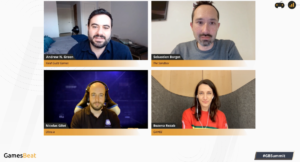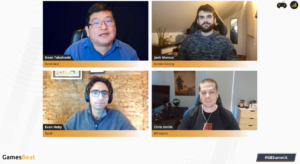Join gaming leaders, alongside GamesBeat and Facebook Gaming, for their 2nd Annual GamesBeat & Facebook Gaming Summit | GamesBeat: Into the Metaverse 2 this upcoming January 25-27, 2022. Learn more about the event.
This week Riot Games promoted John Needham to the president of esports as it doubled down on its investments in esports titles like League of Legends, Wild Rift, and Valorant.
In this new position at Los Angeles-based Riot Games, Needham is leading the organization under which all of Riot’s esports titles and operations will now be unified.
The promotion elevates Needham to be one of the senior-most executives within Riot Games, now reporting to CEO Niccolo Laurent along with Riot’s four other presidents.
Needham will be in charge of 11-year old industry pioneer League of Legends Esports (LoL Esports), the rising shooter esport Valorant Champions Tour (VCT), Wild Rift Esports (which concludes its first global tournament on Sunday), and multiple other games under a new Organized Play umbrella at Riot Games (Teamfight Tactics, aka TFT; Legends of Runeterra, aka LoR; and future games).
Event
The 2nd Annual GamesBeat and Facebook Gaming Summit and GamesBeat: Into the Metaverse 2
January 25 – 27, 2022
While League of Legends esports is not profitable yet, Needham said that the company has grown esports revenues 70% a year in the past four years. Outside of China, more than 4 million people watched the latest League of Legends World Championship that concluded on November 5.
On top of that, the company has launched Valorant and Wild Rift esports. Needham said his mid-range goal for esports is to breakeven and then invest more in the larger ecosystem of teams.

Above: John Needham, right, is president of esports at Riot Games.
Image Credit: Riot Games
Needham said that the company will further professionalize esports, driving toward making its leagues and team ecosystems sustainable. That means that Riot wants esports to hit breakeven results but also have the teams and athletes hit sustainability too.
To date, Riot’s global esports partner roster includes Mastercard, Verizon, Mercedes-Benz, Bose, Unilever, Red Bull, Spotify, Bose, Louis Vuitton, YouTube, Twitch, Cisco, Amazon, Coca-Cola, and State Farm. Red Bull, Verizon, and SecretLab are among the first global partners to support multiple titles or events within Riot’s esports portfolio, an opportunity that will be more readily available in the years ahead. Through activations known as “drops,” Riot is delivering brand benefits directly to fans at events.
Needham joined Riot in 2017. He previously served at roles at Microsoft, including running Lionhead studio, and he held positions at Cryptic Studios, Sony Pictures Entertainment, Telemundo, Gazillion Entertainment, and Sony Online Entertainment.
Here’s an edited transcript of our interview.
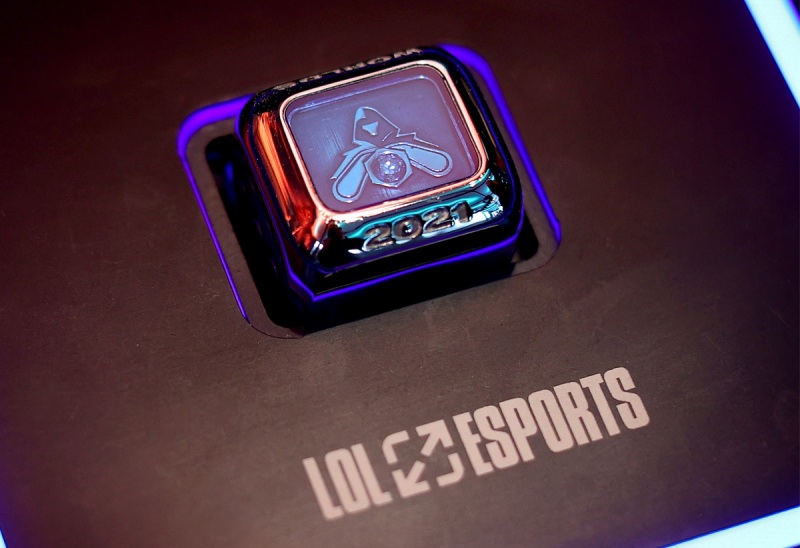
Above: Riot Games and Mercedes Benz have teamed up.
Image Credit: Riot Games
GamesBeat: How might things change for you as you go into this new title and position? Do a lot of your job responsibilities change?
John Needham: It’s a bit daunting. I can start with the bigger picture of what’s happening at Riot Games. I’m not sure anyone’s talked to you about this, but our ambition, our vision as a company, is to become a 21st-century entertainment equally rooted in games. Games will always be the core of our company, but we want to expand the experience of being a player of Riot to esports and now entertainment, with the launch of Arcane.
What’s happened with esports specifically–esports started as an engagement tool for the games division to keep players engaged in League of Legends when they weren’t playing the game. But over the past four or five years, we’ve actually proved out that esports can be a sustainable business on its own. We’ve grown revenues around 70 percent a year for the last four years. We continue to grow viewership. I just saw numbers for Worlds this year. It’s by far the biggest, most viewed Worlds we’ve ever done, which is exciting. We’ve made great strides in continuing to grow the fandom around League of Legends esports.
We’ve launched two new esports this year. We launched Valorant, which had its first full year of esports. It’s off to the races. We’re already generating a lot of fandom around that. And we’re in the midst of our first esports event for Wild Rift and mobile esports. That’s going very well. The game is doing super in China and across Asia. We’re excited. We’re going to have three top esports, hopefully, in the next year or two. I’ll continue to build out this business for Riot as a separate unit within the umbrella of all the businesses at Riot.
GamesBeat: You guys make headlines occasionally around whether esports is profitable for Riot. I don’t know if that’s even a goal. But eventually a goal, I guess? Can you explore that topic?
Needham: My mid-range goal for esports is that we’re breaking even. I’m willing to take anything above break even and flush it out into the ecosystem. One of the bigger challenges we have right now as a business–for our professional teams and our leagues, salaries are growing exponentially. Revenues aren’t keeping up with salary growth. We’re trying to find ways to make our teams better economically in a big way.
This is why I was so excited to have Naz Aletaha come over and be the head of League of Legends esports globally, because of all of her experience in business development and the commercial side of esports. That’s our big focus going forward. How do we make this ecosystem sustainable not just for Riot, but for all of our teams and all of our external stakeholders that are investing in our sport? That’s going to be the real focus.
We’re on a great trajectory. We’re 11 years into the sport, and I would say that in the next three to four years we’ll be sustainable not just for Riot but for our teams. When you look at other sports like the MLS, they still talk about themselves as being a growth sport. It took the NFL a very long time to get to profitability, like 40 years. I feel like we’re ahead of where normal sports would be. It’s purely because we reach this Gen Z, millennial audience that’s really valuable. Non-endemic sponsors want to find efficient ways to reach our audience, and esports is a great way for them to engage and invest.
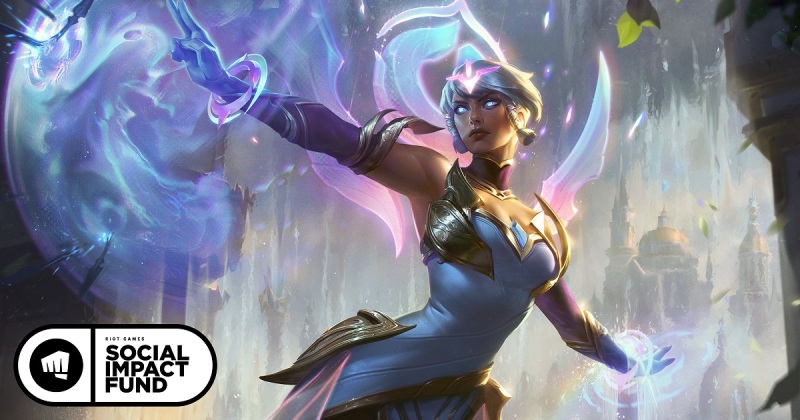
Above: Dawnbringer Karma is part of Riot Games charity campaign.
Image Credit: Riot Games
GamesBeat: Is there a greater emphasis on anything that can help you speed that up or otherwise stay on target?
Needham: We’re working on a few things. One, we think we can build a better viewing experience for esports. We’re primarily distributed on Twitch and YouTube, which are great platforms, but we do things on our watch platform–we have an interactive pick ‘em for Worlds every year. We have about 40 percent of our viewing audience that participates in pick ‘em, and they engage in Worlds at a much higher level than anyone else who just comes in and watches esports. We offer rewards for people who watch esports back in the game. There’s a lot we can do with building out value for our viewers that transcends just watching esports. It transcends into their game experience. In this year’s case, we can enhance their experience watching our game.
GamesBeat: Some people look at Riot and say, “Wow, if they’re not profitable with esports, that’s almost discouraging for the rest of us.” Would you say that you’re different from everyone else, though?
Needham: Here’s the real challenge in the economics of our sport. For traditional sports, they make a ton of money in license fees to TV networks for linear television. Our primary platforms, where our fans are, are Twitch and YouTube. The whole foundation of their business model is that they don’t pay for content. Our content, our esports content, draws tons of viewership on those platforms, but we aren’t getting those huge license fees that you would get on linear TV.
Honestly, I’m not interested in linear TV. I don’t think our fans want to watch esports there. Where the innovation in our business model is going to be is similar to what happened with games when they went to free-to-play. We have this direct connection with our viewers, and we have to find ways to directly monetize them with digital services and digital goods.
We’re starting to work on this. We have a feature called drops, which allows us, through our platform, to push digital codes and digital items direct to viewers. We mostly use this to do virtual activations for our sponsors. During Worlds finals this last year we did a very special drop for all the viewers on our platform from Mercedes. If we attach a commerce platform to this feature, then we can sell skins. If a professional player chooses a certain skin, we can run a flash promotion and sell that direct to viewers through our broadcast stream.
A lot of the lessons we’ve learned in gaming around free-to-play and monetizing digital services and digital goods, we’re going to take a cue from that with watching esports. That’s where the big unlock is going to come from a revenue perspective, where we fill that hole that’s left by broadcast licenses.
GamesBeat: Is there also some changing approach or strategy with the Chinese market? They’re changing some of their rules around how much minors can play games and things like that. Has that made your work more challenging?
Needham: One, we totally respect the Chinese policies. We ultimately live to serve our fans and players. We just have to work within regulations, really around the world. Different countries have different regulations. Not a lot of our business comes from that under-18 demographic, so from a game perspective, I think we’re in pretty good shape.
From an esports perspective the thing I worry about is, most of our professional players will come in at 16, 17, 18 years old. They’re very young when they start their esports careers. We’ll have to see how this impacts the development of new esports talent in China. We may have to find ways to organize with the blessing of the government, obviously, like traditional sports do, having ways to build organized play structures within schools and things like that. But that’s what I worry about, just the ongoing talent development out of China.
GamesBeat: As far as the potential for games like Valorant and Wild Rift to be your next big hits, how do you look at the milestones for that process?
Needham: We only play to win, so I look at the biggest esports in those genres and that’s my target. For Valorant in particular, the biggest FPS esports is still CS: GO. Their biggest event, before just a month ago, they drew around 1.5 million peak concurrent viewers. That was our goal going into Champions this year. They just did a big esports event a few weeks ago, and they reached 2.5 million, so the bar has gone up again. We’re looking at ways we can become the leader in FPS esports — not just tac shooters with CS: GO, but all of FPS esports. CS: GO is the bar right now.
It’s very similar to Wild Rift. We look across Asia and mobile esports are very popular there. KoG is one of the most successful mobile esports. We want to figure out ways that we can differentiate and beat KoG as an esport. We very much look at our competitors, and in a very Riot way, we look at their shows and how they run their esports and think about ways we can improve the experience for our fans.
We’re always going to focus on delivering triple-A quality in our shows. You’ve probably seen this with Worlds. We try to innovate with cutting-edge technology every year, bringing that to bear on our events. Combining music and entertainment sports together to create these moments around our events that make our fans proud and draw a lot of our viewership. Always having just the utmost competitive integrity. We focus on making sure our sport is fair and clean, because we think that matters to our fans. That’s what matters to our sponsors, building this future of the sport that we’re trying to do at Riot.
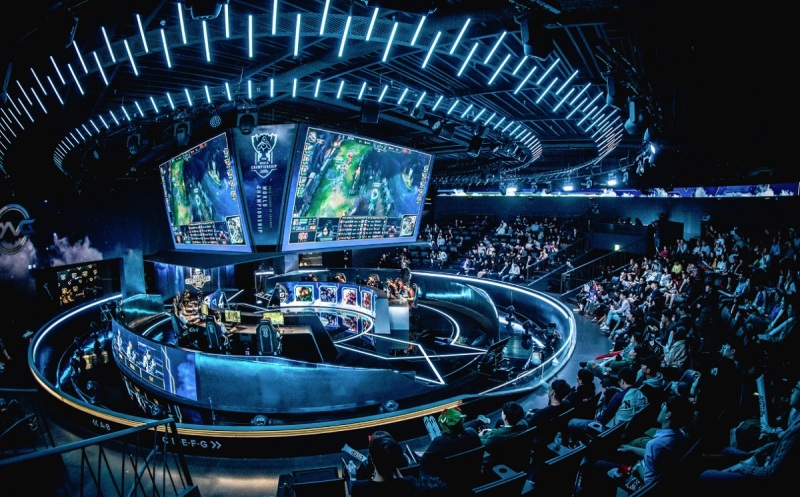
Above: Riot Games’ League of Legends is the biggest esport.
Image Credit: Riot Games
GamesBeat: For Valorant, you were off to a more diverse start with getting women competitors up in the high ranks. How is that proceeding? Does that fit in with your long-range goals as well?
Needham: 100 percent. One of our missions is to be very inclusive to anyone who wants to be a fan of our sport or wants to work in esports. We work at that. For Valorant in particular, Game Changers really surprised us this last year. The viewership around those events was amazing, well beyond what we’d expected. We’re going to continue to expand with Game Changers. You see a lot of the bigger esports organizations forming teams around Game Changers, and we’ve brought it to League of Legends. We’re starting a Game Changers series there with the LCS next year. We’re going to continue to invest in that.
We always look at our fans and our audience makeup. We want to serve them. With Wild Rift, I think we’ll have an even more diverse audience, and we’ll need to do even more tournaments around certain groups of our fans in those games to serve them. Game Changers has been probably one of the things we’re the proudest of this last year. It’s just the beginning of how we diversify our audience.
GamesBeat: How do you do the job now that you’re reporting directly to Nicolo? Is it just more elevated in importance at the company? What does that mean, reporting straight to the CEO?
Needham: Well, for one, Nicolo has been an incredible supporter of esports in general. Nicolo actually challenged us a year and a half ago to deliver a business plan where we go big on Valorant and Wild Rift esports. Riot invested a lot of money in esports. A lot of money. We see how much our fans love it. We see the benefit in how it lifts games and now entertainment as well.
We’re doing other things to support esports. We’re building broadcast centers around the world. It’s called Project Striker. We’re building two big broadcast centers, one in Dublin, and another one in Seattle, that can handle five simultaneous leagues at once, so we can support multiple esports. We can support all of our regional leagues remotely through these broadcast centers. It’s a significant investment that Nicolo has been very enthusiastic about. In order to build the best, highest-quality shows, we need the best infrastructure to power that. We’re an international sport. It never really stops around the world. This infrastructure is going to allow us to continue to produce some of the best content in all of sports.
Another thing we’re investing in deeply is how we can change the viewing experience online for esports viewers. We know that these interactive elements like the pick ‘em I mentioned are effective ways, ways our fans love to interact with our events. We know they want a deeper social experience as well. We’re looking at that. And they want rewards for watching esports that transcend just esports, that go back into the games and other parts of their lives with Riot. We’re investing deeply in our watch platform and how we can make that the very best place to watch esports.
This priority within Riot has unlocked a commitment and an investment at the Riot Games level that’s never really been done in esports. It also gives us more priority with features we need to deliver these broadcasts with the game team. We have spectator clients that float around the game levels during the event. We’re getting a lot more focus from our game teams around supporting these features and building digital content specifically for our events. Wait until you see the Valorant skins for the Champions series. We have music attached to them. They change when you get on a killstreak. It’s really cool. The game teams are leaning into esports more than they ever have before.
GamesBeat: How is the return to physical, in-person events proceeding?
Needham: We miss our fans. I don’t know how many esports events you’ve been to, but there’s nothing like being in a crowd of people going bonkers for your sporting event. We’re desperate to get back to that. But we’re only going to do it–we’re not in control here. We’re not in the driver’s seat. COVID is in this case. We’re only going to do that when we’re very confident that it’s safe for everyone involved, for participants and players and staff working the event. We haven’t gotten there yet. Hopefully this next year we get back to live events with an audience, but as I said, we’re not in the driver’s seat. We’ll see.
GamesBeat: Are you expecting things like NFTs and metaverse development to invade your world as well? Have those buzzwords made it into esports yet?
Needham: We get approached a lot about NFTs. We haven’t engaged with a partner. We have a lot of discussions going on. One, I want to make sure that, with NFTs, we do it in a way that delivers value for our fans, for the fans who invest in NFTs. I want to let the market settle down and see what comes out of that before we go big on NFTs. Two, there isn’t really a collectibles aspect to esports yet. Not like there is in traditional sports where you buy jerseys and signed cards and things like that. We don’t have that business built out for esports yet. I want to think through, going back to the value side of it, how we can build out collectibles that are meaningful for our fans. What is that? What do they want? I don’t think it’s the same as with traditional sports. We’re not going big now on NFTs. We’re watching that carefully. Maybe someday we will when we feel like it will be a great experience for our fans.
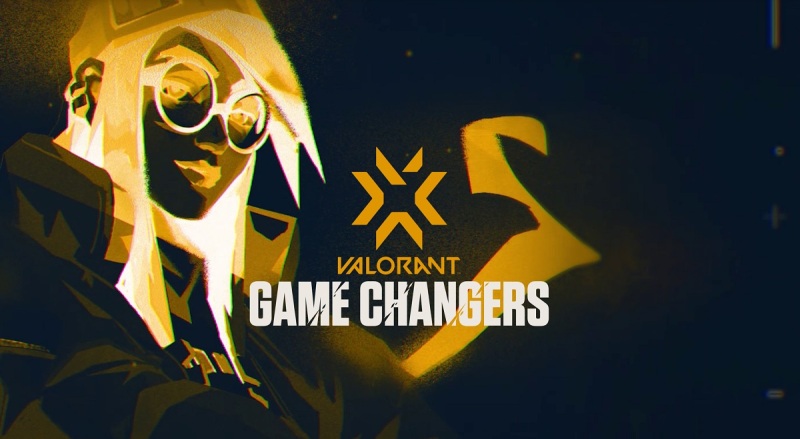
Above: Valorant Game Changers will highlight women and marginalized genders.
Image Credit: Riot Games
GamesBeat: You talked about the different kinds of entertainment. Do you see something like Arcane helping drive the core esports as well? Does that broader entertainment come back and help you in a way?
Needham: I think so. We had our opening ceremony this year, the show opening for Worlds. It was awesome working with the Fortiche guys and our internal entertainment group to craft that show opening in a way that was unique and special for our fans. It was still esports. It still had the music moments that they expected. But as we grow the entertainment side of the business, it’s only going to help us on the esports side and how we produce our events.
We’ve been, in League of Legends anyway, very technical in our approach to the sport. Most of our fans watch to get better at playing League of Legends, which is different from traditional sports. I don’t watch the NBA to get better at basketball. I’m as good as I’m ever going to be at basketball. But our fans watch League of Legends esports to get better at the sport, and the same is true of Valorant and Wild Rift. We’re now trying to broaden out the appeal of Worlds a bit to infuse more of these cultural moments with entertainment and music. Having a stronger entertainment part of our business is only going to help us in that pursuit. We’re going to up ourselves every year. It gets harder and harder to do that. It’ll be nice to have some new creative talent helping with that.
GamesBeat: I’ve written about some of the startups in the space doing things like esports analytics. They’ve been thankful that Riot has been willing to share information with them, so they can do analytics at companies like Elo and Mobalytics, helping people understand how these sports play out, understand why the pros are so good.
Needham: There’s a very deliberate reason why we’re doing that for esports. That helps the teams analyze their player performance in a way so that they can develop their pro players better. We have been very liberal in exposing our data generally to help those teams. It’s the top players in the world playing our games. Any way we can help develop them, we will.
GamesBeat: Any other topics you’d like to cover today?
Needham: Look out for Valorant Champions at the beginning of December. We’re doing a lot of cool things around that event that I think you’ll enjoy. I’m in a dream job right now where I get to combine all my loves into my work, which is amazing. I’m honored and humbled to be working at Riot, working on something I truly believe in. We’re building the future of sport. We really believe that.
GamesBeat
GamesBeat’s creed when covering the game industry is “where passion meets business.” What does this mean? We want to tell you how the news matters to you — not just as a decision-maker at a game studio, but also as a fan of games. Whether you read our articles, listen to our podcasts, or watch our videos, GamesBeat will help you learn about the industry and enjoy engaging with it. How will you do that? Membership includes access to:
- Newsletters, such as DeanBeat
- The wonderful, educational, and fun speakers at our events
- Networking opportunities
- Special members-only interviews, chats, and “open office” events with GamesBeat staff
- Chatting with community members, GamesBeat staff, and other guests in our Discord
- And maybe even a fun prize or two
- Introductions to like-minded parties
- "
- &
- 100
- 11
- 420
- 7
- access
- All
- Amazon
- among
- analytics
- Analyze
- appeal
- around
- articles
- asia
- athletes
- audience
- Basketball
- benefits
- BEST
- Biggest
- Bit
- brand
- build
- Building
- business
- business development
- business model
- business plan
- businesses
- buy
- Campaign
- Careers
- case
- ceo
- challenge
- challenging
- change
- charge
- Charity
- China
- chinese
- Chinese market
- Cisco
- clients
- coca-cola
- collectibles
- Commerce
- commercial
- community
- Companies
- company
- Competitive
- competitors
- content
- continue
- countries
- Covid
- Creative
- credit
- data
- delivering
- demographic
- develop
- Development
- DID
- digital
- digital services
- Diversify
- driving
- Drop
- dublin
- Economics
- ecosystem
- Ecosystems
- educational
- Effective
- efficient
- engage
- engagement
- enhance
- Entertainment
- Esport
- esports
- Event
- events
- executives
- Expand
- experience
- fair
- farm
- Feature
- Features
- Fees
- Figure
- First
- fit
- Flash
- Focus
- Forward
- Foundation
- FPS
- full
- fun
- future
- game
- game industry
- Games
- Gaming
- Gen Z
- General
- Generating
- Global
- globally
- Goals
- good
- goods
- Government
- great
- Group
- Grow
- Growing
- Growth
- head
- Headlines
- here
- High
- Highlight
- How
- HTTPS
- huge
- i
- improve
- Including
- industry
- information
- Infrastructure
- Innovation
- interactive
- International
- Interview
- Interviews
- invest
- investing
- investment
- Investments
- involved
- IT
- Job
- keeping
- latest
- launch
- leading
- league of legends
- LEARN
- learned
- Legends of Runeterra
- Level
- License
- licenses
- Long
- love
- makeup
- Making
- Market
- mastercard
- Matters
- May
- Members
- Mercedes
- Mercedes-Benz
- Metaverse
- Microsoft
- Millennial
- million
- minors
- MLS
- Mobile
- model
- money
- Music
- NBA
- networks
- news
- NFL
- NFTs
- numbers
- offer
- online
- open
- Operations
- Opportunity
- order
- organizations
- Other
- partner
- partners
- Pay
- People
- performance
- perspective
- physical
- picture
- platform
- Platforms
- play
- player
- players
- Playing
- Podcasts
- policies
- Popular
- portfolio
- potential
- power
- president
- presidents
- Pro
- Process
- professional
- profitability
- Profitable
- project
- promotion
- Pros
- quality
- Red Bull
- regulations
- remotely
- REST
- Results
- revenue
- Rewards
- rift
- Riot Games
- rules
- Run
- running
- s
- safe
- salaries
- Salary
- Schools
- SEAT
- Seattle
- sell
- Series
- Services
- Share
- Skin
- So
- Social
- Sony
- sony pictures
- Space
- speakers
- speed
- Sport
- Sports
- Spotify
- stakeholders
- start
- started
- Startups
- State
- stay
- Strategy
- successful
- Summit
- support
- Sustainability
- sustainable
- tactics
- Talent
- Talks
- Target
- Technical
- Technology
- television
- The
- The Metaverse
- the world
- time
- Ton
- tons
- top
- Topics
- tournament
- Tournaments
- traditional
- Transcript
- tv
- Twitch
- unilever
- unique
- us
- VALORANT
- value
- Verizon
- Videos
- viewers
- Virtual
- vision
- wait
- Watch
- What
- What is
- WHO
- win
- within
- Women
- Work
- world
- year
- years
- youtube
- Z
